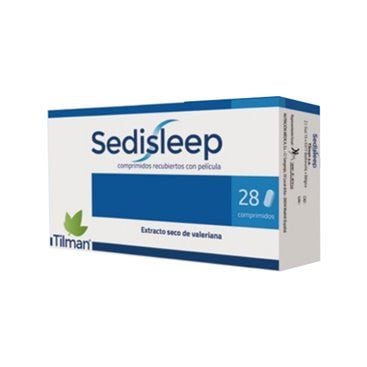Sedisleep 500 Mg 28 Coated Tablets
Sedisleep is a herbal medicine indicated for adults and adolescents over 12 years of age for the relief of mild nervous tension and sleep disorders.
Sedisleep is a herbal medicine indicated for adults and adolescents over 12 years of age for the relief of mild nervous tension and sleep disorders.
Sedisleep (500 Mg 28 Coated Tablets)
ACTION AND MECHANISM
- [HYPNOTICO]. It has been proven in trials with animals and humans that valerian can induce and improve sleep. Although it is not known for sure, the effects appear to be due to valerenic acid and valepotriates. The mechanism of action of these compounds is also not fully clarified. The possibility that they could reduce the degradation of gamma-aminobutyric acid (GABA), increase their release to synaptic spaces and decrease their reuptake is considered. In addition, large amounts of glutamine have been detected in valerian, which could be captured by neurons and transformed into gamma-aminobutyric acid. On the other hand, it has been proven in in vitro assays that hydroxy-pinorresinol is capable of binding to the benzodiazepine receptor.
- [ANTIESPASMODICO]. Valerian produces a smooth muscle relaxation. The effects could be due to an inhibition of the cell's calcium channels or a fixation of valepotriates to the muscle fiber itself.
INDICATIONS
- [NERVIOSISM], [INSOMNIO]: Relief of mild nervous tension and sleep disorders.
Its use is based exclusively on a traditional use.
POSOLOGY
- Adults, adolescents and children> 12 years:
"SEDISLEEP"
In case of mental stress (nervousness): 1-3 tablets 3 times a day
In difficulty sleeping: 1 tablet 30 minutes before bedtime. If necessary, one more tablet can be taken in the afternoon.
Maximum daily dose: 4 tablets / 24h
The effectiveness of valerian root is gradually achieved. To achieve an optimal effect it is recommended to use continuously for a period of 2 to 4 weeks. However, if symptoms worsen or persist for more than 14 days, the clinical situation should be evaluated.
- Children <12 years: Use not recommended.
RULES FOR THE CORRECT ADMINISTRATION
"TABLETS"
They should be taken whole with a glass of water.
CONTRAINDICATIONS
- Hypersensitivity to any component of the medication.
PRECAUTIONS
- [LIVER FAILURE]. Valerian may have hepatotoxic compounds, so in patients with liver damage, it should be used with caution. It is advisable to monitor liver transaminase levels, and if there is a significant increase in them, treatment should be discontinued until the cause of the increase is clarified.
PATIENT ADVICE
- It can cause drowsiness, so it is recommended to be cautious when driving.
- It is recommended to take this medicine at least 2 hours before bedtime. - The effectiveness of valerian root is gradually achieved for this reason is not suitable for the treatment of an acute problem of nervous tension or sleep disorder
SPECIAL WARNINGS
- It is recommended to monitor liver function in patients with hepatic impairment.
INTERACTIONS
- Barbiturates, benzodiazepines, antihistamines H1. Valerian could enhance the sedative effect produced by barbiturates, benzodiazepines or H1 antihistamines.
PREGNANCY
No clinical trials have been conducted in humans, so the use of valerian is only accepted in the absence of safer therapeutic alternatives.
LACTATION
It is not known if the components of valerian are excreted in significant amounts with breast milk, and if this could affect the child. It is recommended to stop breastfeeding or avoid administering this medication.
CHILDREN
The safety and efficacy of valerian in children has not been evaluated. However, the traditional use of Valerian has not produced adverse reactions in the child, so it can be used. However, valepotriates in children under 12 years of age may have adverse reactions, so it is not recommended to use valerian in this age group.
EFFECTS ON DRIVING
Valerian can cause drowsiness, so patients should avoid operating dangerous machinery, including cars, until they are reasonably certain that drug treatment does not adversely affect them.
ADVERSE REACTIONS
Valerian adverse reactions are rare and do not usually require discontinuation of treatment.
- Digestive [NAUSEAS] or [VOMITES] may appear rarely.
- Cardiovascular. Very rarely [CARDIAC ARRITHMIA] can occur.
- Neurological / psychological. With continued use, occasionally [CEFALEA], [NERVIOSISM] or [INSOMNIUM] may appear.
- Eyepieces Following continued use, [MIDRIASIS] phenomena may occasionally occur.
- Osteomuscular. Rarely [MIASTENIA] may occur.
In addition to these adverse reactions, other possible adverse reactions have been included in the FEDRA database (Spanish Pharmacovigilance, Adverse Reaction Data) of the Spanish Pharmacovigilance System, although a cause-effect relationship with Valerian has not been demonstrated:
- Hepatic. Kidney damage and increased levels of transaminases.
- Generals. Asthenia and excessive sweating.
OVERDOSE
Symptoms: After the intake of doses greater than 20 g of root, a mild condition occurred with symptoms such as abdominal spasms, chest tightness, fatigue, hand tremors and mydriasis, which disappeared within 24 hours.
At very high doses, intestinal atony and cardiac arrhythmias such as bradycardia may occur.
Treatment: The treatment will be symptomatic, with the usual measures such as gastric lavage and administration of activated carbon and sodium sulfate.
In case of overdose or accidental ingestion, go to a medical center or consult the Toxicological Information Service, indicating the product and the amount ingested.



